This site is supported by our readers. We may earn a commission, at no cost to you, if you purchase through links.
 When choosing the best food for golden retrievers, you’ll want to prioritize high-quality protein sources that support their active lifestyle.
When choosing the best food for golden retrievers, you’ll want to prioritize high-quality protein sources that support their active lifestyle.
Look for dog foods packed with lean meats, essential omega-3 fatty acids, and balanced nutrients suited to large breed needs.
You’ll need to evaluate your golden’s age, weight, and activity level when selecting nutrition.
Veterinarian-recommended brands like Purina Pro Plan and Royal Canin offer specialized formulas that address golden retrievers’ unique health requirements.
Avoid artificial preservatives and opt for foods with natural ingredients.
Want to guarantee your furry friend stays healthy and energetic? The right diet is just the beginning of understanding your golden’s nutritional journey.
Table Of Contents
- Key Takeaways
- Golden Retriever Nutrition Needs
- Choosing Best Dog Food
- Top 8 Best Foods for Golden Retrievers
- 1. Purina Pro Plan Large Breed Dog Food
- 2. Royal Canin Golden Retriever Adult Dog Food
- 3. Eukanuba Adult Large Breed Dog Food
- 4. Hills Science Diet Adult Lamb Rice Dog Food
- 5. Purina One Large Breed Adult Dog Food
- 6. IAMS Adult Large Breed High Protein Dog Food
- 7. Blue Buffalo Large Breed Dog Food
- 8. Blue Buffalo Chicken Dog Food
- Feeding Golden Retrievers at Different Life Stages
- Managing Health Issues With Diet
- Frequently Asked Questions (FAQs)
- What is the best dog food for Golden Retrievers?
- Can Golden Retrievers eat chicken?
- Can Golden Retrievers eat dry dog food?
- How do I choose the right food for my Golden Retriever?
- What is the best dog food for Golden Retrievers with allergies?
- What can a golden retriever eat on a maintenance diet?
- What is the best food to give a golden retriever?
- What is the most common food allergy in golden retrievers?
- What is the number one healthiest dog food?
- What is golden retriever’s favourite food?
- Conclusion
Key Takeaways
- You’ll want to prioritize high-protein dog foods like Purina Pro Plan or Royal Canin that support Golden Retrievers’ unique nutritional needs, focusing on muscle development and joint health.
- Your dog’s diet should change throughout their life stages, with carefully balanced proteins, fats, and nutrients tailored to their age, weight, and activity level to prevent obesity and maintain optimal wellness.
- It’s crucial to watch for potential food allergies by choosing limited-ingredient diets and avoiding common triggers like chicken and beef, which can cause skin irritation and digestive issues in Golden Retrievers.
- You’ll need to consider more than just calories—look for foods with natural ingredients, omega fatty acids, and essential vitamins that support heart health, coat shine, and overall immune system function.
Golden Retriever Nutrition Needs
If you’re a Golden Retriever owner, understanding your dog’s unique nutritional needs is essential for their long-term health and vitality.
Your furry friend requires a balanced diet rich in high-quality proteins, essential vitamins, and carefully selected nutrients that support their growth, energy levels, and overall well-being.
They need these nutrients to thrive, and a proper diet will help ensure their long-term health.
Protein Requirements for Growth
Protein is the cornerstone of your Golden Retriever’s growth journey.
Fuel your golden’s journey with protein-packed nutrition, powering muscle growth and boundless energy.
Large breed puppies need high-quality protein sources to support muscle development and overall health.
AAFCO recommends at least 22% protein for growing dogs, with puppies requiring 45g protein per 1,000 kcal.
Choose protein-rich meaty morsels that provide essential amino acids for ideal puppy nutrition.
Importance of Vitamins and Minerals
Your Golden Retriever’s vitality hinges on a delicate nutrient dance.
Dietary supplements packed with vitamins and minerals support their robust health, reducing disease risks.
Omega-3s and antioxidants fight inflammation, while key nutrients like Vitamin D and E maintain bone strength, muscle function, and cellular defense.
Proper nutrient absorption guarantees your furry friend stays energetic and resilient.
A balanced diet that includes natural dog vitamins is essential for maintaining peak health in Golden Retrievers, ensuring they receive the necessary nutrients for optimal well-being and robust health.
Role of Carbohydrates in Dog Diet
After vitamins fuel your pup’s body systems, carbohydrates provide the energy engine that keeps them running.
Your dog’s diet needs smart carb sources that support digestion and sustained wellness.
Consider these grain benefits:
- Nutrient-rich grains provide steady energy
- Complex carbohydrates aid digestive health
- Starch content supports metabolic functions
Brown rice, oats, and whole wheat deliver balanced nutrition without spiking blood sugar.
Healthy Fats for Energy and Coat Health
Typically, healthy fats are the secret sauce in your golden retriever’s diet, providing an energy boost and transforming their coat from dull to dazzling.
Here’s a quick guide to understanding these nutritional powerhouses:
| Fat Source | Nutritional Benefit |
|---|---|
| Salmon Oil | Omega-3 fatty acids |
| Chicken Fat | Energy and coat shine |
| Flaxseed | Omega-rich nutrients |
| Fish Oil | Joint and skin health |
| Coconut Oil | Metabolism support |
These omega-packed ingredients keep your furry friend’s tail wagging and coat gleaming, thanks to the energy boost and nutritional benefits they provide.
Choosing Best Dog Food
Choosing the right food for your Golden Retriever guarantees they get the nutrients needed for a healthy, active life.
Focus on high-quality ingredients, balanced nutrition, and AAFCO compliance to support their overall well-being.
Factors to Consider in Dog Food Selection
You’ve learned about protein needs; now let’s explore how to pick the perfect chow for your furry friend.
Choosing dog food isn’t just about filling the bowl—it’s about supporting your golden’s health journey. Consider these key factors:
- Your pup’s unique nutritional blueprint
- Age-specific feeding guidelines
- Hidden food allergens that trigger reactions
- Quality ingredients that fuel vitality
Meeting AAFCO nutrition standards is essential for your dog’s overall health. Your golden deserves a diet as golden as their heart.
Avoiding Fillers and Artificial Preservatives
After finding the right dog food, it’s time to steer clear of hidden health hazards.
Artificial preservatives and fillers can harm your furry friend’s long-term wellness.
Your Golden deserves more than empty calories and chemical additives.
Choosing a diet with natural dog food options can substantially improve their overall health.
This is because natural ingredients provide a better alternative to harmful additives.
| Fillers to Avoid | Why They’re Bad | Healthier Alternatives |
|---|---|---|
| Corn Syrup | Weight Gain | Sweet Potato |
| Meat By-Products | Low Quality | Whole Meat Protein |
| Artificial Colors | No Nutritional Value | Natural Ingredients |
| Chemical Preservatives | Potential Health Risks | Natural Preservatives |
Choose natural ingredients for a vibrant, healthy companion, and avoid fillers like corn syrup and artificial colors to ensure your dog’s well-being.
By making informed decisions, you can provide your Golden with the best possible care, focusing on whole meat protein and natural preservatives.
Importance of AAFCO Statements and Nutritional Balance
After ditching artificial fillers, it’s time to decode dog food labels with confidence. AAFCO standards are your nutritional roadmap for golden retrievers.
Look for labels that prove balanced diets through rigorous testing:
- Verify complete and balanced nutritional statements
- Check life stage-specific nutrient ratios
- Confirm AAFCO feeding trial compliance
- Understand dietary guidelines for peak health
Your pup’s nutrition hinges on these golden rules of canine diet planning.
Top 8 Best Foods for Golden Retrievers
You want the best nutrition for your Golden Retriever, and choosing the right food is essential for their health and happiness.
With our carefully researched top 8 picks, you’ll find scientifically formulated options that support your dog’s specific nutritional needs and promote superior wellness.
1. Purina Pro Plan Large Breed Dog Food
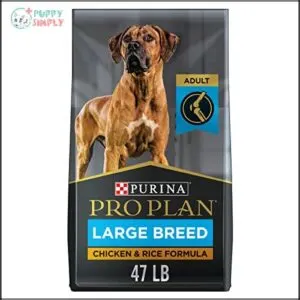
Purina Pro Plan’s Large Breed Dog Food champions your Golden Retriever’s health with real chicken as its primary ingredient.
Packed with 26% protein and guaranteed live probiotics, this formula supports your furry friend’s muscle conditioning and digestive wellness.
The kibble delivers joint-supporting glucosamine and EPA omega-3 fatty acids, ensuring your large breed stays active and healthy.
Specially designed for dogs over 50 pounds, it provides complete nutrition without artificial additives, making it a top choice for discerning pet parents.
Best For: Owners of large breed dogs over 50 pounds who want a nutritious, joint-supporting formula using real chicken as the main ingredient.
- High protein content (26%) supports muscle conditioning.
- Contains glucosamine and omega-3 fatty acids for joint and mobility health.
- Includes probiotics for improved digestion and immune support.
- Some dogs may experience vomiting or difficulty chewing the kibble.
- Occasional quality issues, such as reports of beetles or larvae in the bag.
- Heaviness of the 47-pound bag may be inconvenient for some users.
2. Royal Canin Golden Retriever Adult Dog Food
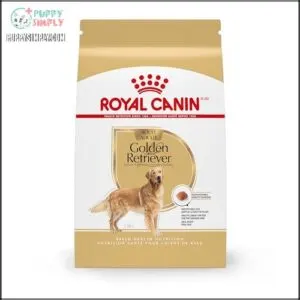
Royal Canin stands out as a breed-specific formula painstakingly designed for Golden Retrievers over 15 months old.
Its specialized kibble matches your dog’s unique muzzle shape, encouraging proper chewing and dental health.
Packed with taurine, EPA, and DHA, this food supports heart function while maintaining an ideal weight.
The precise nutrient balance addresses Golden Retrievers’ specific needs, reinforcing skin barriers and promoting a lustrous coat. It’s more than just food—it’s personalized nutrition that speaks directly to your furry friend’s well-being.
Best For: Golden Retrievers aged 15 months and older, especially those with skin, coat, or weight management needs.
- Breed-specific formula tailored for Golden Retrievers’ unique health needs.
- Supports heart health with taurine, EPA, and DHA.
- Reinforces skin barrier and promotes a healthy, shiny coat.
- Higher price compared to average dog food options.
- Lower protein content than some other brands.
- Wet food variety may lack appealing texture for some dogs.
3. Eukanuba Adult Large Breed Dog Food
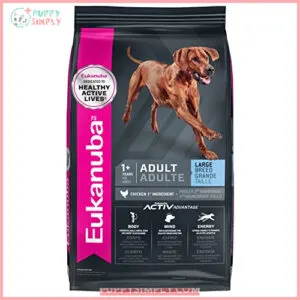
At the heart of your Golden Retriever’s nutrition, Eukanuba Adult Large Breed Dog Food delivers a powerhouse of health benefits.
With high-quality chicken as the first ingredient, this formula supports lean muscle development and joint health through optimized glucosamine and chondroitin levels.
Designed for dogs over 15 months weighing 55+ pounds, it provides a balanced diet with natural fiber, prebiotics, and essential nutrients to keep your furry friend thriving and energetic, supporting joint health.
Best For: Large breed adult dogs over 15 months old and weighing 55+ pounds, especially those needing support for muscle development, joint health, and digestion.
- High-quality chicken as the first ingredient for lean muscle support
- Includes glucosamine and chondroitin for joint health
- Blend of natural fibers and prebiotics for gentle digestion
- Pricing may be higher compared to similar brands
- Limited protein source options (primarily chicken or lamb)
- Not suitable for dogs under 15 months or under 55 pounds
4. Hills Science Diet Adult Lamb Rice Dog Food
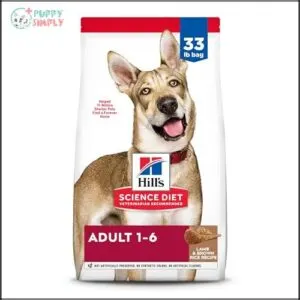
Hill’s Science Diet Adult Lamb Rice Dog Food is a nutritional powerhouse designed for large breed dogs.
Packed with high-quality lamb protein, this formula supports muscle maintenance and provides essential nutrients for your Golden Retriever.
Natural sources of glucosamine and chondroitin promote joint health, while omega-6s and vitamin E guarantee a lustrous coat.
Recommended for adult dogs aged 1-5 years, it meets AAFCO nutritional standards and offers a balanced diet that’ll keep your furry friend feeling their best.
Best For: Large breed adult dogs aged 1-5 years requiring a lamb-based diet for muscle maintenance and joint health.
- High-quality lamb protein supports muscle maintenance.
- Natural glucosamine and chondroitin promote joint health.
- Omega-6s and vitamin E improve coat health.
- Not suitable for small or medium breed dogs due to large kibble size.
- Limited flavor options available.
- Premium pricing compared to other brands.
5. Purina One Large Breed Adult Dog Food
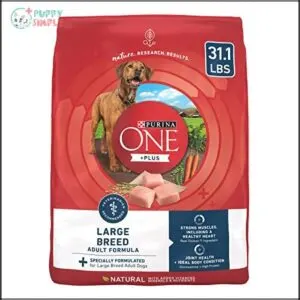
Within the sphere of large breed nutrition, Purina One Large Breed Adult Dog Food stands out as a top contender.
This scientifically formulated kibble packs a punch with real chicken as its primary ingredient, delivering 26% protein to support your Golden Retriever’s muscle development.
Loaded with four antioxidant sources and omega-6 fatty acids, it promotes immune health and a lustrous coat.
Veterinarian-recommended and crafted in U.S. facilities, this food offers balanced nutrition without artificial preservatives, making it a smart choice for your furry friend’s well-being.
Best For: Owners of adult large breed dogs seeking balanced nutrition, strong muscle support, and overall well-being in their pets.
- Contains real chicken as the first ingredient for high protein and muscle support.
- Includes antioxidants and omega-6 for immune health and a shiny coat.
- No artificial preservatives or fillers, crafted in U.S. facilities.
- Not suitable for puppies or breeds with different dietary needs.
- Some users reported heavy panting in younger dogs after consumption.
- Limited flavor options compared to other large breed formulas.
6. IAMS Adult Large Breed High Protein Dog Food
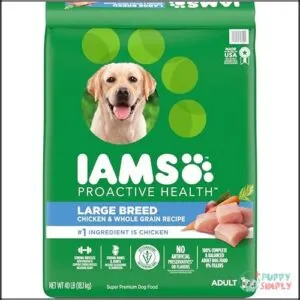
Because your golden retriever deserves top-tier nutrition, IAMS Adult Large Breed High Protein Dog Food delivers precisely what they need.
With real chicken as the first ingredient, this kibble packs a protein punch from chicken and egg sources.
It’s enriched with 7 essential heart-supporting nutrients and antioxidants, promoting whole-body health.
The wholesome grains and veggies guarantee balanced nutrition, while its affordable price makes it an excellent choice for conscientious pet parents wanting quality without breaking the bank.
Best For: Large breed adult dogs, especially Golden Retrievers, needing high-quality protein and balanced nutrition.
- Not suitable for puppies or senior dogs with specific needs.
- Some customers report supply issues.
- Smell may be unappealing to some pet owners.
- Real chicken as the first ingredient for strong muscles.
- Affordable option for premium large-breed dog food.
- Includes nutrients and antioxidants for heart and whole-body health.
7. Blue Buffalo Large Breed Dog Food
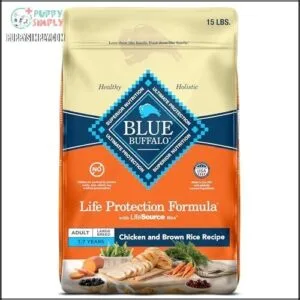
Packed with real deboned chicken and carefully selected whole grains, Blue Buffalo Large Breed Dog Food offers a nutritional powerhouse for your furry friend.
The formula includes L-Carnitine, Glucosamine, and Chondroitin to support lean muscle and joint health.
LifeSource Bits boost immune function, while Omega 3 and 6 fatty acids promote a shiny coat.
Free from artificial preservatives and common allergens, this dog food provides a balanced diet that’ll keep your large breed companion healthy and energetic, supported by LifeSource Bits.
Best For: Large breed adult dogs needing high-quality, natural ingredients to support joint health, muscle development, and overall well-being.
- Contains real deboned chicken and whole grains for balanced nutrition.
- Includes Glucosamine and Chondroitin for joint and mobility support.
- Free from artificial preservatives, corn, wheat, and soy.
- Reports of missing expiration dates on some packaging.
- May be associated with cases of dilated cardiomyopathy in some dogs.
- Physical packaging can vary, leading to inconsistency in appearance.
8. Blue Buffalo Chicken Dog Food
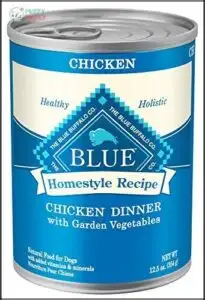
Blue Buffalo’s Chicken Dog Food offers a mixed bag for Golden Retrievers.
While it promises natural ingredients without by-product meals, some pet owners report concerns about nutritional balance and potential health risks.
The food features high-quality deboned chicken and boasts no artificial preservatives, but testimonials suggest it might cause digestive issues or kidney problems for some dogs.
Always consult your veterinarian to determine if this brand suits your Golden Retriever’s specific dietary needs.
When evaluating dog food, consider the importance of grain free diets and their potential impact on your dog’s health.
Best For: Owners seeking dog food with natural ingredients and no by-product meals for their pets.
- May cause digestive issues or kidney problems in some dogs.
- Reported concerns about nutritional imbalance for Golden Retrievers.
- High calorie count may leave dogs feeling hungry with smaller portions.
- Made with high-quality deboned chicken as the main ingredient.
- Free from artificial preservatives, colors, and flavors.
- Includes wholesome grains and garden vegetables for balanced nutrition.
Feeding Golden Retrievers at Different Life Stages
As a Golden Retriever owner, you’ll need to adjust your dog’s diet to match their changing nutritional needs throughout their life stages.
From puppy growth to senior care, understanding the right balance of proteins, fats, and essential nutrients will help you keep your furry friend healthy, active, and thriving, with a focus on complete concepts.
Puppy Feeding Schedule and Nutritional Needs
After exploring top dog foods, let’s focus on your Golden Retriever puppy’s nutritional journey.
Puppy nutrition demands precision: small, frequent meals fuel rapid growth and development.
Your furry friend needs carefully measured portions to support healthy bone structure and energy levels.
A well-planned diet includes proper Golden Retriever Food to promote overall health.
- Protect future health through strategic feeding
- Nurture your puppy’s potential with balanced meals
- Build strong foundations with customized nutrition
- Prevent potential health risks through smart choices
Adult and Senior Feeding Considerations
As your golden retriever matures into adulthood, their nutritional needs shift dramatically.
Here’s a quick guide to keeping your furry friend healthy and thriving:
| Stage | Protein Needs | Calorie Requirements |
|---|---|---|
| Adult | 25-30% | 1,200-1,500 daily |
| Senior | 20-25% | 900-1,200 daily |
Focus on high-quality proteins, joint-supporting nutrients, and digestible formulas to support their changing metabolism and maintain ideal Senior Nutrition for healthy aging.
Considering a homemade food diet can be beneficial in addressing specific health issues and providing essential nutrients customized to your golden retriever’s needs.
Managing Weight and Preventing Obesity
As your furry friend enters adulthood, weight management becomes your top priority.
Portion control is key—measure meals precisely and avoid free-feeding.
Opt for low-calorie, nutrient-dense dog food that supports weight management.
Supplement with healthy snacks like carrots or green beans.
Regular exercise and monitoring your golden retriever’s body condition score can help prevent obesity and maintain ideal health.
Managing Health Issues With Diet
You can transform your Golden Retriever’s health through strategic dietary choices that target specific medical concerns.
By understanding how nutrition impacts conditions like cancer, allergies, and joint problems, you’ll empower yourself to proactively support your dog’s well-being and longevity, which is crucial for their overall longevity.
Dog Cancer and Natural Ingredient Diets
If your golden retriever faces cancer, their diet becomes a powerful ally in the fight.
Natural ingredients can starve tumor cells and boost immunity.
Your dog’s nutrition matters more than ever:
- Choose foods rich in cancer-fighting compounds like turmeric and curcumin
- Limit carbohydrates to less than 25% of their diet
- Focus on high-quality, easily digestible proteins
Tailored nutrition could be their best defense against the disease, making it a crucial aspect of their care, and emphasizing the importance of natural ingredients.
Addressing Atopy and Food Allergies in Golden Retrievers
These persistent atopy challenges wreak havoc on your Golden Retriever’s comfort, but strategic dietary interventions can provide significant allergy relief.
Let’s break down food sensitivities and skin health management.
| Symptom | Potential Trigger | Management Strategy |
|---|---|---|
| Itching | Protein Allergens | Limited Ingredient Diet |
| Skin Inflammation | Grains/Additives | Hypoallergenic Foods |
| Ear Infections | Food Sensitivities | Novel Protein Sources |
| Digestive Issues | Common Allergens | Elimination Diet Approach |
Targeted nutrition helps combat dog food allergies through careful, veterinarian-guided dietary modifications. Utilizing hypoallergenic dog food options is essential for managing skin health issues in Golden Retrievers.
This approach is crucial for providing allergy relief and improving the overall well-being of your Golden Retriever, by addressing food sensitivities and promoting healthy skin through novel protein sources.
Preventing Joint Issues and Heart Problems With Diet
Through careful diet selection, you can shield your Golden Retriever from joint and heart challenges.
- Choose lean proteins to support muscle development
- Include glucosamine supplements for joint health
- Balance omega fatty acids to reduce inflammation
- Consider taurine supplementation for heart care
Proactive nutrition helps prevent hip dysplasia and potential cardiac issues, ensuring your furry friend stays active and healthy.
Frequently Asked Questions (FAQs)
What is the best dog food for Golden Retrievers?
With 60% of Golden Retrievers battling obesity, you’ll want Purina Pro Plan Large Breed.
It offers high-quality chicken protein, live probiotics, and targeted nutrition to keep your pup healthy, happy, and in top shape.
Can Golden Retrievers eat chicken?
Yes, you can safely feed your Golden Retriever chicken.
It’s a fantastic protein source packed with essential nutrients that supports muscle growth and overall health.
Always serve it cooked, plain, and without seasoning.
Can Golden Retrievers eat dry dog food?
Like a well-oiled machine, your Golden Retriever thrives on high-quality dry dog food suited to their life stage.
You’ll want to choose nutrient-rich kibble packed with proteins, ensuring balanced nutrition that supports their active lifestyle and overall health.
How do I choose the right food for my Golden Retriever?
Pick a nutrient-rich, breed-specific dog food with high-quality protein, balanced minerals, and omega fatty acids.
Consult your vet, consider your pup’s age and health, and switch foods gradually to support ideal nutrition and well-being.
What is the best dog food for Golden Retrievers with allergies?
Ironically, your allergy-prone pup’s dietary nightmare can become a dream with limited-ingredient diets.
Opt for hypoallergenic foods featuring novel proteins like duck or salmon, and consult your vet to pinpoint and eliminate specific allergens, using limited-ingredient diets.
What can a golden retriever eat on a maintenance diet?
On a maintenance diet, feed your golden retriever high-quality protein sources like chicken or fish, with balanced carbohydrates, essential fatty acids, and portion-controlled meals.
These meals should be adapted to their age, weight, and activity level.
What is the best food to give a golden retriever?
Purina Pro Plan tops the charts for Golden Retrievers, offering high-quality chicken protein, live probiotics, and targeted nutrition.
This nutrition will keep your furry friend healthy, energetic, and thriving from puppyhood through senior years, with benefits including live probiotics.
What is the most common food allergy in golden retrievers?
You’ll often find chicken and beef are the top culprits for golden retriever food allergies.
Watch for symptoms like itching, ear infections, and digestive issues that might signal a protein-related allergic reaction.
What is the number one healthiest dog food?
Purina Pro Plan emerges as the top dog food, offering high-quality protein, live probiotics, and targeted nutrition for large breeds like golden retrievers.
It ensures overall health and well-being with scientifically formulated ingredients.
What is golden retriever’s favourite food?
Your Golden Retriever likely loves chicken, beef, or salmon-based foods with real meat as the first ingredient.
They’ll gobble up high-protein, flavorful kibble that satisfies their taste buds and nutritional needs, keeping their tail wagging with joy.
Conclusion
By a stroke of luck, you’ve discovered the secret to your golden retriever’s peak health through nutrition.
Selecting the best food for golden retrievers isn’t just about filling their bowl—it’s about fueling their well-being.
With veterinarian-recommended brands and carefully chosen ingredients, you’ll support your furry friend’s long-term wellness.
Remember, each meal is an investment in your dog’s energy, coat health, and overall quality of life.
Your golden deserves nothing less than nutritional excellence.




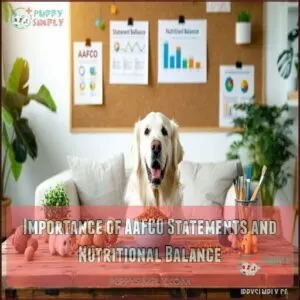


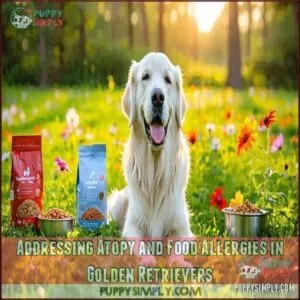





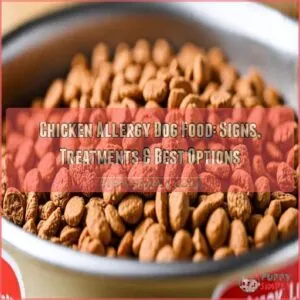

Lovable dachshund puppies
August 14, 2020 at 10:53 AM
Lovable Dachshund Puppies website provides you all kinds of dogs and puppies. This website is the most classified website in United states, for sale , adoption dachshund puppies. Mini Dachshund puppies are the best breed, we provide you with all vaccination.A dog is a long term joy and a long term commitment on your part. So you deserve to feel real peace of mind knowing you are protected for the whole time you are together with your dog. This is what you receive from lovable dachshund puppies, guaranteed.The LOVABLE DACHSHUND PUPPIES website provides a totally free to use advertising platform for private individuals, responsible breeders and rescue centers to list their adverts on.